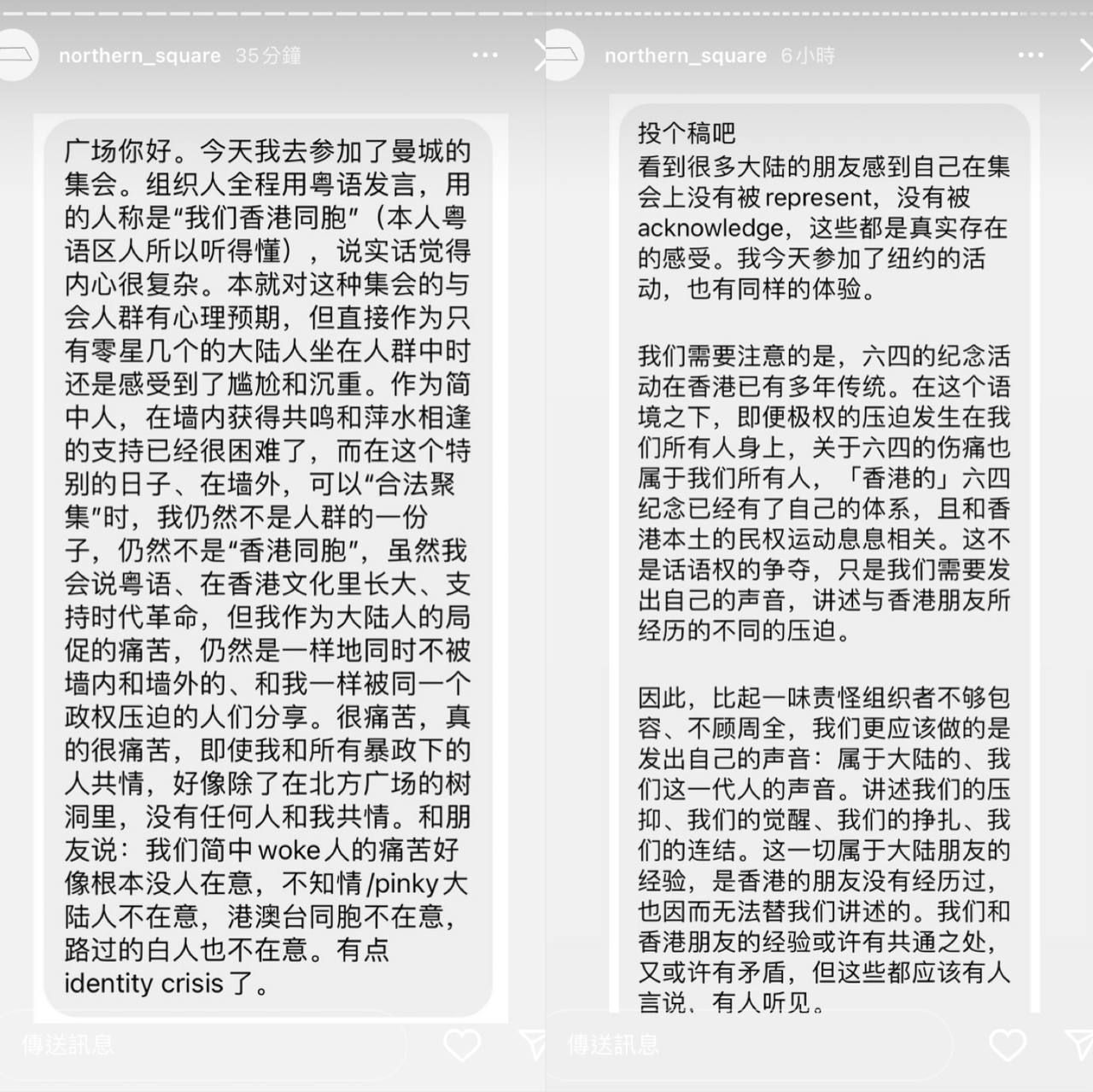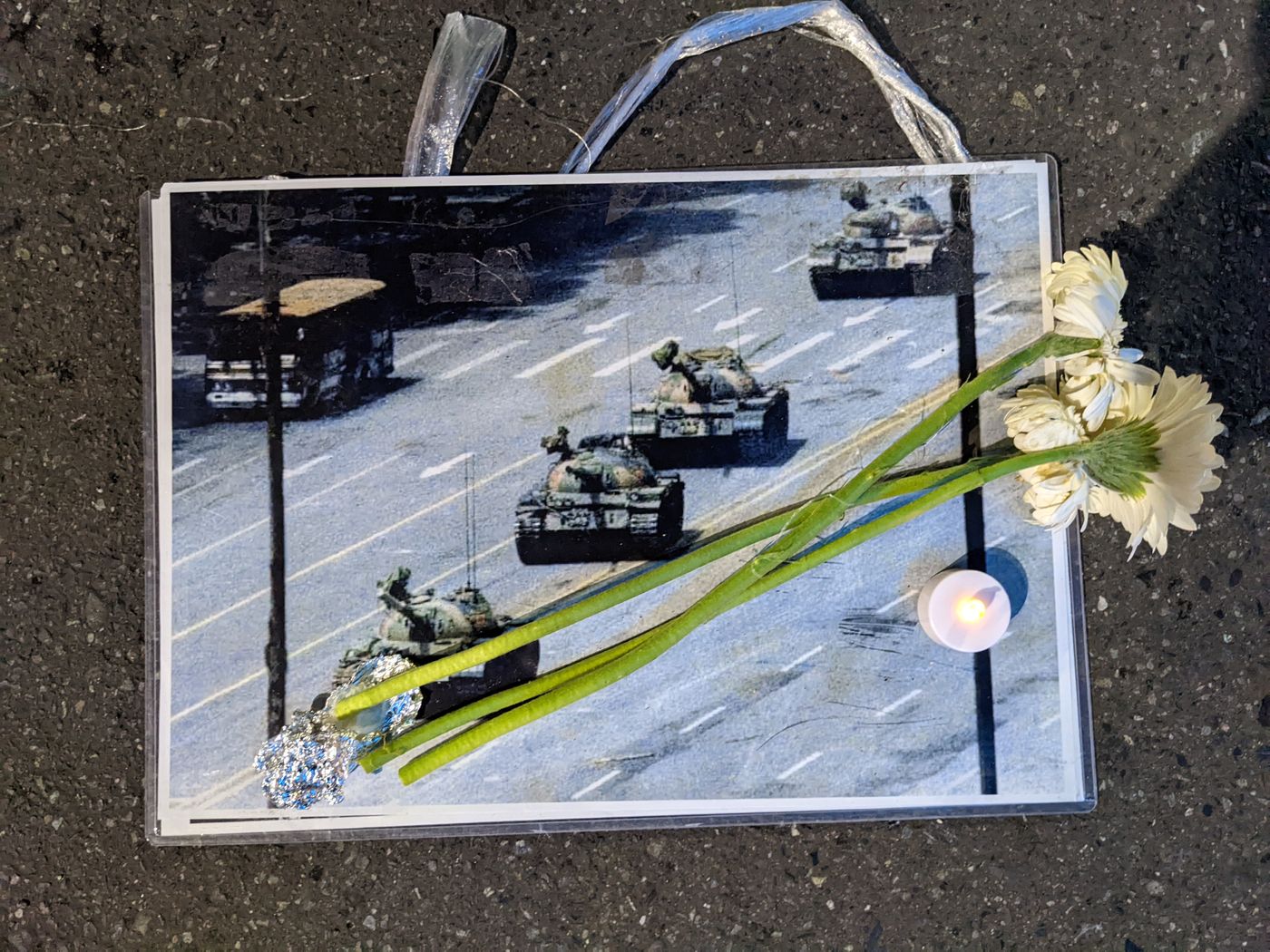Don't forget June Fourth? Restoring Hong Kong? ——Remember the observation and thinking of a commemorative event
On the day of June 4th, there was a commemoration meeting on the streets of Shinjuku, Tokyo, and it was rare to have a chance to get in touch with the contents of June 4th, so I also went to join in the fun. Just a few days ago, I saw @Matty mentioned in the article that there is no sense of belonging when overseas Chinese mainlanders participate in the commemorative activities organized by Hong Kong people. Regarding this point, on the day after I participated (perhaps it could only be regarded as an observation?) After the event, I thought about it a lot, so I would like to share my thoughts.

I agree with these two submissions very much, the one on the left is out of emotional empathy, and the one on the right is out of rational understanding.
Understanding as an Observer
How to understand the shouting of "Recover Hong Kong" at the June 4th commemorative event? Aside from the political stance of the organizers themselves, I can understand the significance of the June 4 incident to Hong Kong people from a rational perspective.
First of all, Hong Kong and the June 4 incident itself have deep historical origins. The Hong Kong people never regarded June 4 as someone else’s business from beginning to end, and they were deeply involved in it. It was said that supporting students was still a patriotic movement at that time. Second, the annual commemorative activities after the June 4th incident have been internalized as part of the political culture of Hong Kong people. In a sense, the closest place to the June 4th incident is not in Beijing but in Hong Kong . Third, from the Yellow Umbrella Movement of the year to the anti-extradition movement in recent years, the political environment in Hong Kong is deteriorating in reality. Especially after the routine commemoration of June 4th was banned, the commemoration of June 4th is becoming more and more not just a matter of An event to commemorate history, but as a spiritual symbol of resistance to dictatorship and authority, it is combined with the actual struggle of Hong Kong people . As a result, the slogans developed in the anti-extradition movement will appear in the June 4 commemoration activities. When Hong Kong people's concerns about their own real problems surpassed their concerns about June 4, the rally's slogan became "Recover Hong Kong, revolution of the times" instead of "Don't forget June 4."
Of course, at the tactical level, starting from the purpose of enhancing the cohesion of the Hong Kong people, "Recover Hong Kong, the revolution of the times" is far more powerful than the slogan with the theme of June 4th, and it can also attract the attention of the local Japanese people. . After all, it is the kingly way to gather popularity in a gathering, and not understanding the content is the next best thing.
feelings as a participant
Doubt, discord, alienation. This is my most intuitive personal feeling as an ordinary participant.
When I saw the flags at the rally site from a distance, they were all banners of "Recover Hong Kong Times Revolution" with white characters on a black background. When I approached the crowd, the slogan I heard was also "Recover Hong Kong Times Revolution" in Cantonese and Japanese. ". This made me ask myself, isn't this a rally to commemorate June 4th? Or is this a commemoration of June 4, which belongs to the people of Hong Kong? Could it be one June Fourth, two narratives?
It is not that I do not support Hong Kong people's struggle for freedom, and I admire their courage to resist tyranny. But the theme of the event really made me wonder, is it commemorating June 4th? Or the liberation of Hong Kong? Not only was I puzzled, but even more than one Japanese passing by complained and didn't know who they were shouting to. Which leads to another question, who is the audience for this rally? Japanese? Hong Kong people? Or mainland Chinese?
If we say this is for Hong Kong people to listen to and to unite Hong Kong people to continue their struggle, then I think this event is a success. Against the backdrop of the impossibility of large-scale commemorative activities in Victoria Park, it is a continuation of the struggle for Hong Kong people overseas to take up their responsibilities and persevere.
If it is called to the Japanese, I think they are half-successful. No matter whether they understand the historical context or not, at least the momentum is very strong, and the awareness has increased. If there is attention, there will be pressure from public opinion.
So what about mainland Chinese? Obviously, the truth about June 4th should be known the most, and the June 4th should be remembered the most, but the people in mainland China who are most directly related are the most insignificant beings. The number of Chinese people who go to commemorate is not very small, but even those who support Hong Kong people's struggle for freedom may hardly resonate with the slogan of the revolution of the era of liberating Hong Kong. Because this is the June 4th commemoration event, it is natural for those who can come to the event to participate in the event. First of all, they should come with the purpose of commemorating the June 4th and mourning the deceased, but the focus of the slogan is on Hong Kong. It's hard to empathize without your own feelings.
Slogans, identities, and language are needed to create a sense of my own person, but this event failed to give me a sense of community in those areas. It seems that the Chinese are just insignificant outsiders to this scene, and the June 4th Movement is clearly a matter of our group. I am neither part of the Hong Kong people nor included in a larger community.
Reason tells me I should be here. Since Hong Kong people take June 4th as their own business, morally I should also take their commemoration activities as my own. However, the atmosphere at the scene made me constantly wonder who I am and why I am here. Who are the people present to commemorate June 4th? As a Hong Konger independent of the Chinese? Or as a general Chinese? Or as freedom-lovers more broadly? I have no idea.
Doubt provokes a sense of discord, and discord breeds alienation. That's how I really felt at the time.

then again
But then again, I have no right to complain. The people of Hong Kong have remembered this history for us and guarded it for more than 30 years. Besides, the organizers of the event are Hong Kong people. Of course, the June 4th Movement should be described more from the perspective of Hong Kong people. The participation of overseas Chinese in this commemorative event is really like borrowing flowers to offer Buddha. Since it is borrowing flowers to offer Buddha, there is nothing to criticize. From the perspective of the organizers, they will think: If they feel that it does not meet their expectations, then you Chinese people who are overseas can do it yourself? Not only can I not refute this point, I even agree with it very much - we really need to commemorate this history in our own way.
For mainland Chinese like me, June 4th is far from being abstracted into a spiritual symbol —many Chinese people don’t even know what June 4th is, and some people are trying their best to avoid it, try their best to forget it, and even try to forget it. Don't talk about those who don't want people to remember June 4th. What we long for most now is the reconfirmation and truth that that history actually existed. As for the abstract spiritual symbols derived from it, it is too extravagant for us. Perhaps, all we can pay now is to offer a flower or light a candle to silently express our condolences, and at the same time let more people know about it and let future generations remember it. Let’s start by knowing and remembering June 4th. This may be a more practical way for the younger generation of mainland Chinese to respond to June 4th.
Said so much, not to blame a certain group, nor to start a war, just to be able to better communicate and take the first step - that is to say the truth. Please forgive me if I offended you.
Like my work? Don't forget to support and clap, let me know that you are with me on the road of creation. Keep this enthusiasm together!



- Author
- More